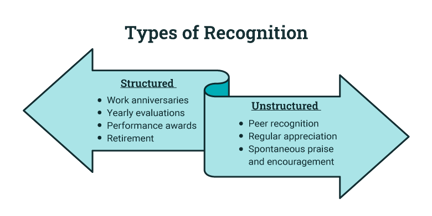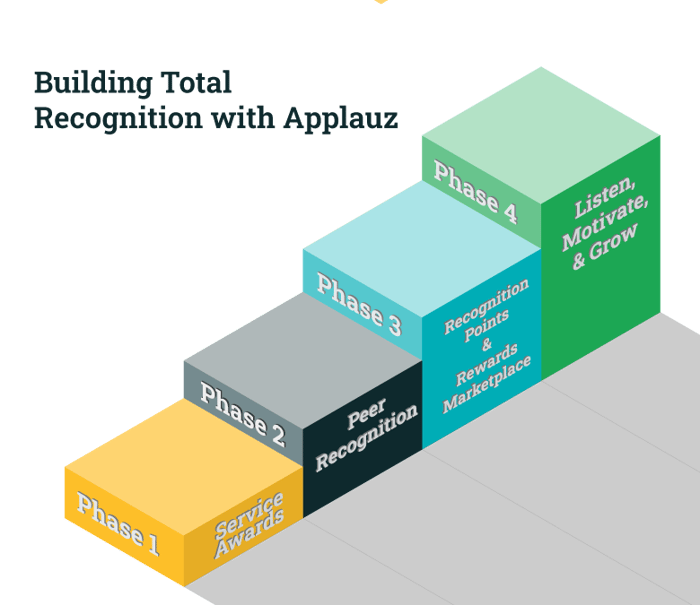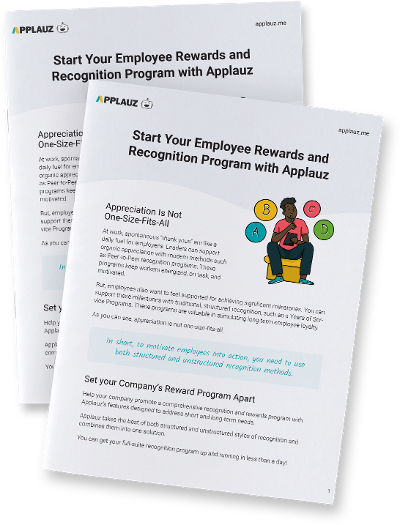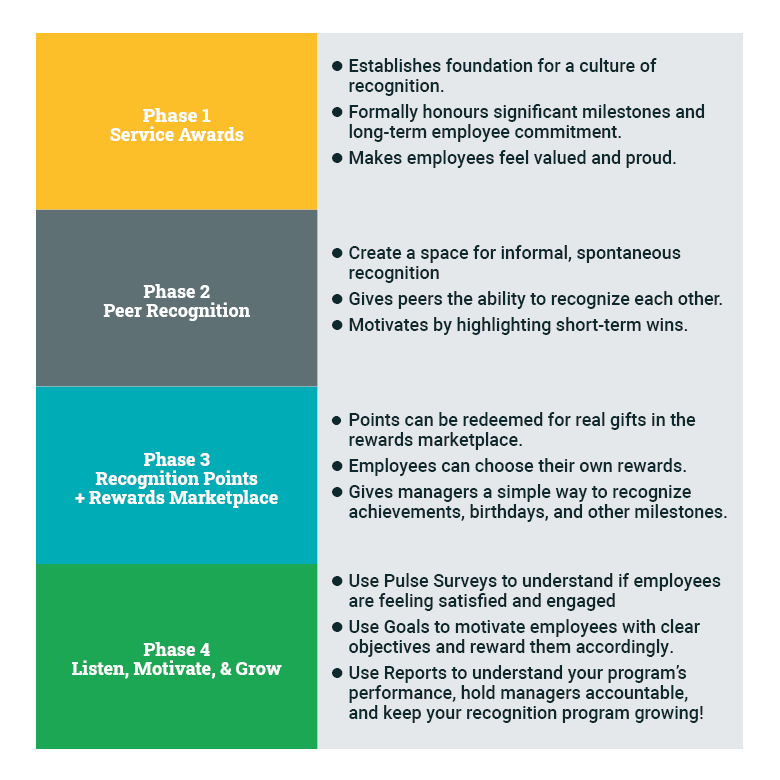Recognition is one of the most important factors driving employee engagement.
Every employee wants to feel valued and appreciated. This is a basic human need, at home but work as well.
We don't have to look far to find research and studies supporting this idea:
- A lack of recognition remains one of the most common reasons why employees leave an organization. And further research suggests that the more talented the employee is, the faster they leave if they feel underappreciated. (Gallup, 2017)
- Employees who were recognized in the last month were 50% more engaged than those recognized over a month ago. (Acheivers, 2020)
- Employees who do not feel adequately recognized are twice as likely to say they'll quit in the next year. (Gallup, 2016)
- 37% of the 200+ employees surveyed said their most desired area of company improvement was recognition. (Software Advice, 2020)
It's a universal truth. When people don't feel regularly appreciated and valued, they begin to feel frustrated and resentful. This notion transcends work contexts, industry, age, culture, and gender.
Appreciation drives connection and replenishes our mental gas tanks. In short, these small moments of connection build safety and trust over time.
Embracing Appreciation at Work
To that end, many companies have attempted to implement a variety of activities, ideas, and initiatives to make appreciation a greater priority in their work culture.
Yet, many attempts at growing appreciation in the workplace fall short.
Why?
Because many businesses don't realize that recognition is not one-size-fits-all. In other words, they assume one type of recognition program should be enough to make employees feel happy and valued.
The reality is human motivation is complex. A blend of short-term and long-term needs inspires people into action.
To illustrate, think about the difference between all these forms of recognition found in the workplace:
- Getting a pay raise at your yearly evaluation.
- A company executive offers you a plaque or gift for a significant work milestone.
- Receiving unplanned, sincere praise from your manager in a group meeting.
- Getting taken out to lunch by your manager as a gesture of thanks.
As you can see, there are different types of recognition. Each one has a distinct level of effort and personalization put into it. And in extension, every kind of recognition has a different impact on an employee's motivation and level of engagement.
Structured vs. unstructured recognition
Ultimately, one singular recognition program or method cannot address all of your employees’ needs.
For example, maybe your business already supports recognition through formal systems like a length of service program or pay raises during annual evaluations.
These structured forms of recognition are essential yet happen rarely.
As a case in point, many employees won’t even make it to their 5th anniversary, usually the first milestone in a work anniversary program. And making employees wait until their yearly evaluation for recognition is simply too long.

In short, structured recognition programs are a good starting point. Still, companies cannot achieve their HR goals with a single type of recognition method.
Bottom line: A mix of unstructured and structured recognition is required to meet different employee needs and achieve long-term HR goals.
4 Phases: Growing Total Recognition
Reaching your long-term HR goals can take time! You can’t expect employees to adopt these changes overnight.
To help, we’ve broken down the process of building a culture of engagement and recognition into four distinct phases. This way, your employees have time and space to adjust to changes and a new system before moving on to the next phase.
Let’s go into a bit more detail about each phase and the goals and benefits of each.

Phase I - Laying the foundation with Service Awards
Service Awards are often called length of service programs or work anniversary programs. Typically, the milestones celebrated begin at 5 years, and are celebrated every five to ten-year intervals until retirement.
A Service Awards program is the foundation for a culture of recognition to grow. As such, implementing this type of program is the first phase of building a strong culture of engagement and recognition for your workplace.
Benefits of Celebrating Service Awards
- Expected: Predictable recognition is essential because it gives employees a sense of security and something to look forward to.
- Formal: The formal nature of these recognition methods gives praise more weight. As a result, employees feel proud and valued to receive recognition.
- Inclusive: Every employee is included and gets recognized. No one feels left out.
- Drives long-term dedication: A traditional recognition program is an excellent tool for making employees feel valued on a long-term basis.
Phase II - Making space for spontaneous appreciation with Peer Recognition
Traditionally, employees are given recognition from their manager or supervisor. However, the modern workplace is changing, and the need for recognition from peers is also growing in importance. Research has even found that employees both want to receive appreciation from their supervisors and their colleagues.
Moreover, peer recognition is spontaneous and informal. As such, it's an essential next step in building a culture of recognition and engagement. This system allows employees to give recognition, but also show each other general support and encouragement.
Benefits of Peer-to-Peer Recognition
- Flexible & Frequent: Employees or managers don’t have to wait for a formal meeting to give praise. And spontaneous praise ultimately feels more genuine and special.
- Personalized: Unstructured recognition is more precise — employees are praised for specific skills and accomplishments — so workers feel special.
- Peers are involved: Informal programs allow employees to receive praise from coworkers.
- Drives short-term performance: Consistent gratitude helps boost daily morale and keep short-term motivation on track.
Phase III - Leveling up with Points and tangible rewards
Employees want to be recognized and appreciated for a job well done. But sometimes a little extra appreciation is warranted. That’s where Points come in, to help give recognition more weight and for employees to not just get recognized, but get rewarded as well!
A study by Globoforce found that employees who receive regular small rewards, in the form of money, points, or thanks, are eight times more engaged than those who receive compensation and bonus increases only once a year.
You can start incorporating points once employees have a hang of giving regular appreciation with a peer recognition system.
Benefits of Points & rewards
- Gives recognition more weight: Points have real-world value and help workers understand the value of their recognition. As such, receiving Points creates more meaning for both the giver and the receiver. This leads to more positive feelings, and in extension, greater program participation.
- A simple way for managers to reward top performers: Points provides managers with an easy and fast way to reward top performers. There's no need for managers to spend time thinking about what to get their employees as a reward.
- Employees choose their own reward: Many businesses spend time and money on rewards employees don't want. The most significant benefit of Applauz Points is that they give employees the flexibility to choose a reward that they will actually enjoy.
Phase IV - Listening to employees and measuring your program's impact
When you adopt a new system, it will take time for employees to become accustomed to a new tool and ways of working. This is to be expected!
Keeping track of employee involvement in the program and motivating them to participate is best practice if you want to grow your program in the right direction.
Applauz offers all the tools for you to track, measure, and grow your recognition program.
- Applauz Pulse Surveys: Help you understand if employees are satisfied with your company as a whole and your recognition and rewards program as well.
- Applauz Goals: Helps give employees clear objectives and direction. Create goals to incentivize employees to get more involved with the program.
- Applauz Report: Gives you a 360 view of your program's performance. Helps spot teams, managers and employees who are the most (or least) involved.
Start Your Employee Rewards & Recognition Program with Applauz
Your Roadmap is Ready
Recognition is a critical part of a well-rounded employee engagement program.
Yet, the goal of growing appreciation in the workplace can feel so large and vague. And therefore, it can feel daunting at best and utterly impossible at worst.
It doesn't have to be this difficult...
The key to getting started is breaking down this fuzzy long-term goal into small, concrete steps. And then to focus energy on one step at a time.
To that end, our step-by-step framework for growing total recognition can help businesses get started on the right foot. And ultimately, take the guesswork out of developing your programs.
A clear roadmap is already ready for you!
About the author
 Michelle Cadieux
Michelle Cadieux
Michelle is a content writer for Applauz. She holds a Bachelor's degree in Psychology from Concordia University, and she has been writing about work and employee happiness for over five years.


